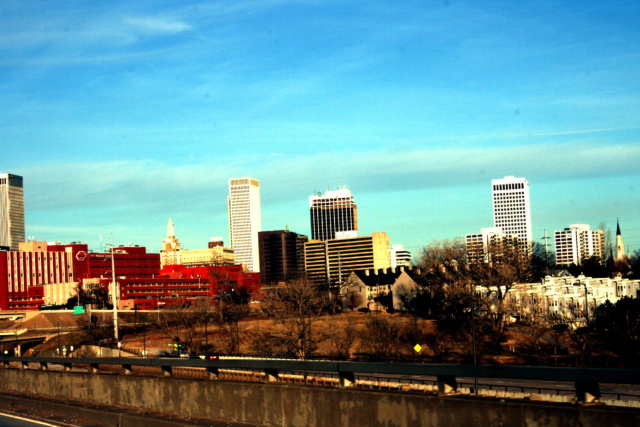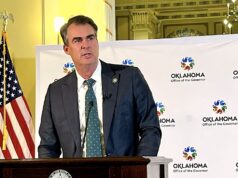
Nick Kristof and David Kirp had two noteworthy commentaries about Tulsa published in The New York Times on April 1. Although neither was a joke, their juxtaposition of Oklahoma’s contradictory political culture is flat-out bizarre.
First, the public reaction to In Trump Country, Shock at Trump Budget Cuts, but Still Loyalty made Kristof worry that our weirdness could be infectious. The author suggested that, “maybe we need more junior year ‘abroad’ programs,” so Americans on the coast and in our “flyover” country get to meet each other.
Counterintuitively, Kristof’s article on Trumpism in Tulsa refers to other accomplishments of the city’s service providers. His story could not be told without reviewing the great work done by Tulsa Domestic Violence Intervention Services and Tulsa WorkAdvance. One Tulsan portrayed in the article said the domestic-violence program saved her life. Another asked why spend money building a wall to keep immigrants out instead of investing in the education necessary for them to get a high-quality job?
Unwavering Trump loyalty fuels ‘infectious’ rage
Both, however, remain loyalists to President Donald Trump even after he has begun trying to kill the programs they see as so constructive. Kristof describes how a kindergarten teacher grew tearful when describing the program that helped her and her son escape an abusive relationship. She is “aghast” that Trump would cut its federal funding, but she remains loyal to him.
None of the Trump supporters Kristof spoke with regretted their votes. They all said that they might even re-elect Trump. This echoes a recent poll that found only 3 percent of Trump voters would vote differently if they could do it over again.
This Tulsa Trumpism prompted an intense reaction by Kristof’s national readers. Comments beneath the article feature sentiments like the following, with 332 recommendations since April 2:
Let them hit bottom , then they might change.
I have ZERO sympathy for them. They were all pro Trump as long as it was someone else getting shafted..now let them reap what they have sown..
I agree with Kristof that the resulting “torrent of venom” is “as misplaced as the support for Trump from struggling Oklahomans.” I’m also, “afraid that Trump’s craziness is proving infectious, making Democrats crazy with rage that actually impedes a progressive agenda.”
Trump loyalty rooted in ‘deaths of despair’
The story gets stranger with Kristof’s follow-up editorial, My Most Unpopular Idea: Be Nice to Trump Voters.
One key reason why working-class conservatives vote against their economic interests is, “the mockery of Democrats who deride them as ignorant bumpkins. The vilification of these voters is a gift to Trump,” Kristof writes.
Kristof explains, however, that the Oklahomans and others who turn to Trump deserve empathy, not ridicule. These voters seem to be reacting to the mortality rates for poorly educated whites. Such rates “have soared since 2000 and are now higher than for blacks at all education levels.” Kristof cites Angus Deaton and Anne Case of Princeton University, who say the reason is, “‘deaths of despair’ arising from suicide, drugs and alcohol.”
Kristof previously compared our state’s extreme poverty to that of Bangladesh. Meanwhile, the Washington Post compared Oklahoma’s rise in the death rate for undereducated, middle-aged Oklahomans to those of “extremely rare” upheavals, “such as Russia immediately after the collapse of the Soviet Union.”
(The Journal of the American Medical Association [JAMA] found that, from 2001 to 2014, poor men in Tulsa were tied for the nation’s fourth-lowest life expectancies, with Oklahoma City males living just one-tenth of a year longer. Poor Oklahoma City women had the second-lowest life expectancies, with Tulsa women living only one-tenth of a year longer.)
People are strange (and complex)
As Jim Morrison sang, “People are strange.” I would add complex, too. Another Times contributor, David Kirp, reminds in Who Needs Charters With Public Schools Like These?, that we also are neighborly
The wonderful programs Kirp describes at the Tulsa Union Public School System as well as the creative way that students respond to their teachers are also the human products of we, the “featherless bipeds.”
Dave Lopez, a founder of OKC’s Edgemere community school, also notes Oklahoma ranks 45th in the nation for overall health. At the same time, he writes that, “We also have some often-overlooked good news,” such as the following as bottom-up, local efforts to improve our health. Lopez cites:
- OU Fit, which serves its 800 employees and their families who work at the Oklahoma Health Center;
- Hearts for Hearing, a provider of auditory-verbal therapy;
- Sunbeam Family Services, one of the state’s oldest community agencies;
- the Oklahoma Caring Vans, which provides mobile health care;
- and Crossings Community Clinic.
People are complicated. Contradictory feelings extend beyond Oklahomans. We’ve made some especially dumb political mistakes — both recently and throughout our history. Let’s get to work, building on the best of our state. We can remain individualistic without being so self-indulgent and retain our neighborliness and responsibility for each other.
(Correction: This post was updated at 9:40 a.m. Friday, April 14, 2017, to attribute the New York Times commentaries to their proper authors. NonDoc regrets the initial error.)





















